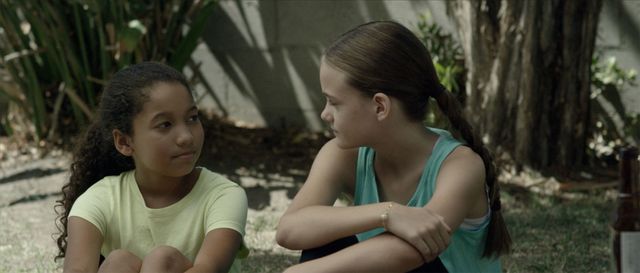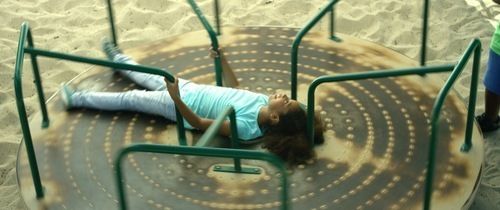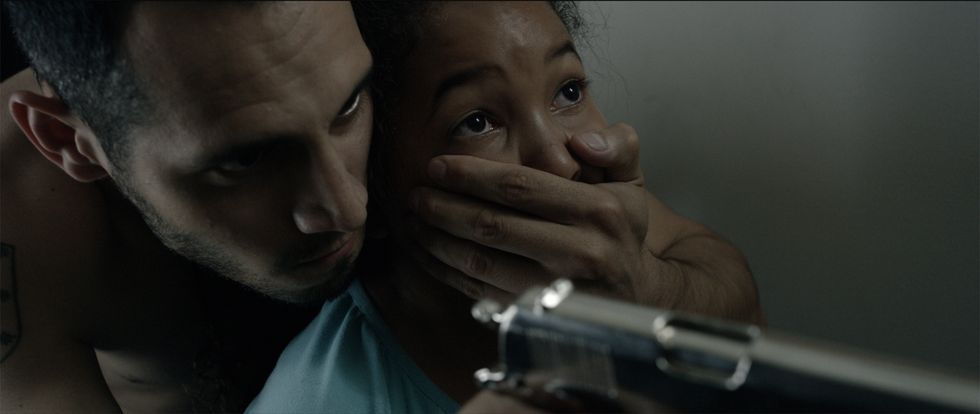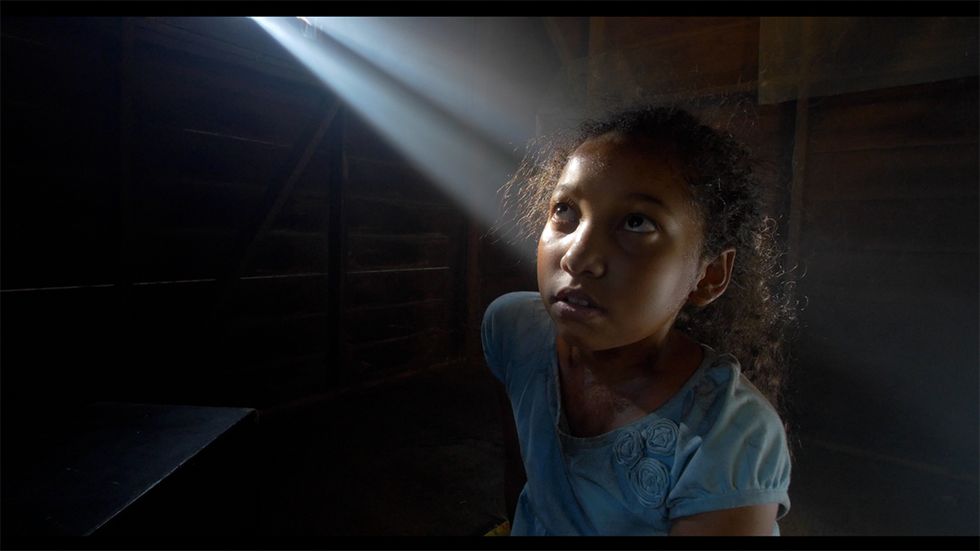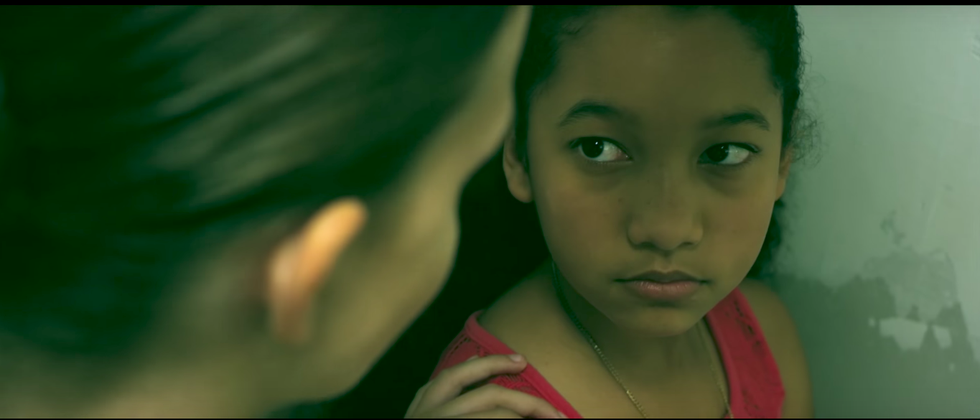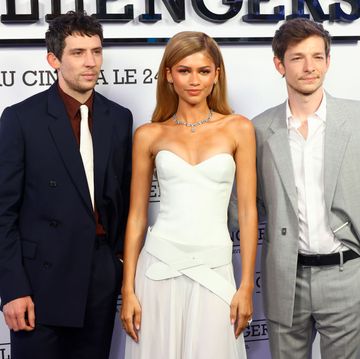You won't enjoy I Am Still Here. Don't get us wrong: it's a good film. Great, even (the feature recently won Best Feature at the Nice Film Festival). But it's a tough watch. An utterly heartbreaking and highly uncomfortable 104 minutes that will linger long after you've left the cinema, in fact.
But, as first-time director Mischa Marcus rightly says, 'this film is not for your comfort.' She actively wants you to feel uneasy. Unnerved. A little queasy. Why? It details the gruesome realities of sex trafficking - an offence which, according to the United Nations Office of Drugs and Crime, is set to overtake drugs and weapons as society's most pervasive crime.
That's why I Am Still Here is so important. The film is told from the perspective of 10-year-old Layla (played by the exceptional Aliyah Conley), who is stolen from her family in a local park and is held captive by abductor Ricky (Johnny Rey Diaz).
The film is yet to find a distributor, meaning it won't be in cinemas just yet, but the effects of this subject matter stretch far beyond the dark, quiet confines of a cinema. What better reason to call up director Marcus and producer Stephanie Bell to find out more.
Micha, this is your first feature length film. Was it daunting tackling such a big topic?
M: Yes, but a lot of media outlets cover human trafficking when it's in news: 'We just busted this brothel,' or 'These children have been rescued,' and then it drops out of sight. I was curious. I was studying filmmaking and I needed to know what happens to these girls after that. How do these experiences effect these girls long term? What services are offered? How do they start over?
I read that a trafficking wing was busted in your area...
M: Yes, it was horrifying. I grew up feeling very safe in a Los Angeles neighborhood and you take that for granted when something like this happens. You realise there are children whose innocence is being stolen and it could have happened to you or someone you know. It's really important for me, and for [the film's producer] Stephanie, that we make people realise you're not as safe as you may think.
You did exhaustive research into real sex trafficking cases. Did anyone stick out?
M: A young women named Jennifer Kepton. She was branded [with the initials of] her trafficker, just like Layla is in the film. It happens to a lot of girls – they're forced to get tattoos of the trafficker's name so they're marked like a piece of property. Jennifer tragically passed away a couple of weeks ago but she had an organization in Ohio, called Survivors Ink, where she helped girls paint over their 'branding' with a beautiful work of art. In this way it wasn't a constant reminder they were someone else's property. They had a chance of starting a new.
Despite the obvious, did anything particularly shock you?
M: The fact that most of these girls are put out on the street by someone they know. You think it's an abduction or a stranger, but a lot of the time it's actually a family member. We're talking a mother, a father, an uncle, a babysitter, a brother. Sex trafficking really doesn't discriminate based on age, race or sex. There's always someone out there that can sell you.
Girls of colour are disproportionately more likely to be victimised by sex trafficking. How important was it to you to represent that in the film?
M: Unfortunately you do find this is more prevalent in the black and Hispanic communities. We made sure we showed an Asian girl, a white girl, a black girl, and Hispanic girl in the film. But age is really the prized marker, really. Younger is considered more desirable in its own disgusting way. That's the main goal. We found a guy who was studying to be a priest in San Diego who was recently busted for trying to have sex with an infant. A six-month old. These are people that hide in plain sight, who have decent jobs and it's kind of horrifying to think the people that you think you may know, you don't really know.
The actress who plays 10-year-old Layla, Aliyah Conley, is also very young. Were you concerned filming traumatic events – even if fake – would harm her?
M: Our priority was that the children felt safe. The children's parents were on set and explained what was going on. With the more upsetting scenes, we were very careful in the way that we shot the film so the children didn't know exactly what we were depicting.
S: A couple of different production companies wanted us to swap the young girls for 17 or 18-year-olds to make them feel more comfortable. I felt like that was doing a disservice to these girl's lives…
And also missing the point?
M: Exactly. I was like, 'this is not for your comfort.' It should make you uncomfortable because the fact is this is happening. The average age of someone being trafficked is 11 to 13. I'm not going up the age to make you more comfortable.
You wouldn't call the ending of the film happy, exactly, but Layla does escape and find her family again. How typical is that of children who get trafficked?
M: If the child is taken away from their parents, then sometimes. If the parents are the ones doing the sex trafficking, sadly, no. The problem is there just isn't the support. In the US, approximately 13,000 animal shelters exist for animals that have been abused, neglected or let go off. There are only 32 shelters for under aged (under 18) sex trafficking survivors. That's in the entire country. So a lot of these girls end up in juvenile detention centers which essentially makes them feel like they were the were ones that were doing wrong, so then they don't know any better and they feel like they're constantly been punished and victimized over and over again.
How important was it that women told this story?
M: I can't emphasis this point enough. 80 per cent of those who are sex trafficked are women and children. And it's a money-maker. Statistics say it's a 32 billion dollar a year industry.
S: That's only on the States, too. Right now, I think it's 100 billion worldwide and it's going to reach 300 billion. And it's not just the people who sell, it's those who buy that are the real problem. A big bust happened last year where I live, in Palm Springs, and 250 people including doctors, lawyers, nurses, businessman, clergymen, and entertainment industry people were arrested. It's not just drug addicts that are doing this. Thankfully that's one the biggest successes we've had from the film so far: people are talking about it. But we need to be loud and in your face about this because, well, we have to be.

